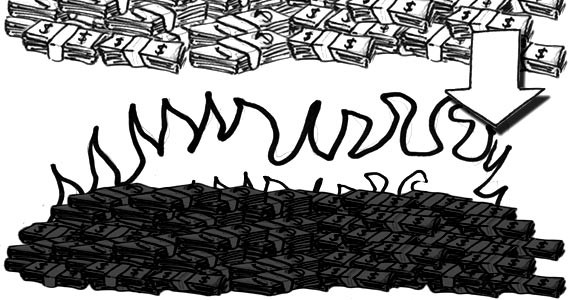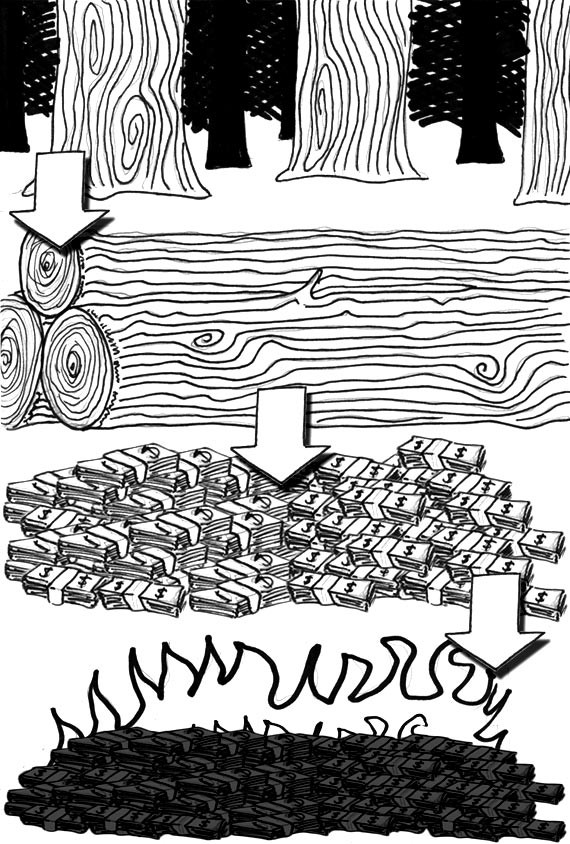Since NewPage announced it was closing its Nova Scotia operation, the province has scrambled to stash money on that sinking ship. Now premier Dexter has announced $15 million to keep 300 people cutting wood for a closed paper mill.
Our energy sector runs on an equally archaic and sadistic model: an enforced private sector monopoly. The NewPage closure has mashed up the two sectors thanks to biomass.
With the bankruptcy of NewPage, which was supposed to turn useless trees into energy, the province wants us to believe that clearcutting is sustainable and will save jobs.
So 175,000 tonnes of wood on more than 600,000 hectares of Cape Breton land---a ninth of provincial forestry capacity---were guaranteed, without consultation, to Nova Scotia Power. That guarantee was made a year ago when it became public knowledge that NewPage faced crippling debt.
NewPage or no, the $200 million biomass plant would be built, and NSP would profit. The province says wood must burn for it to meet its 25-percent-renewable-energy-by-2015 target. The irony is that without NewPage, a massive energy consumer, our total energy market just shrunk considerably. The 25 percent renewable target is now achievable without biomass.
"They aren't making the connection between their energy goals and what the forest can actually handle," adds Gretchen Fitzgerald, director of Sierra Club Atlantic.
Matt Miller, a forester at Ecology Action Centre and board member of the Nova Scotia Woodlot Owners and Operators Association, says the writing has been on the wall for Nova Scotia's forestry industry at least since a 2008 UNB report predicting "the pulp and forest industry wasn't going to contribute as much to GDP anymore because the cheap wood fibre, the low-cost high-yield stuff, was all used up, and as long as the cost of oil is high the dollar will be high, and the price of paper here will be low, even compared to Quebec which has lower energy costs."
The industry's biggest clients---magazines, catalogues and newspapers---are declining thanks to the internet, and new technology has allowed them to buy good quality paper made from faster growing southern hardwoods for less. The emerging paper markets are Asia and South America.
"The ability to keep mills open in Nova Scotia depends on hundreds of millions of dollars in subsidized wood-cutting costs and cutting pay for the workers," Miller says.
In terms of sustainability, NewPage was the best mill we had---the only one certified by all three major sustainable forestry labels. But its progressiveness was only relative to Nova Scotia's pulp-and-paper dinosaurs. The old forestry model involves pulping everything---even trees too big to hug. Revenue maximization. What replaces those behemoths is of little financial value.
There is a better model for forestry and energy, sitting in front of us, apparently unseen. NewPage's closure presents an opportunity to bring forestry in line with our competitive advantages.
"Acadian forests in their natural state are better quality," Miller says. "In the long term, creating higher-quality forest products employs exponentially more people, in better jobs, per unit of wood."
That would involve better silviculture. New York State subsidizes its woodlot owners not to clearcut. The water, which is cleaner and more abundant with trees, is worth more than the wood, financially, socially and ecologically.
Regarding energy, Fitzgerald says despite all the public consultation there has been little strategic thought on renewables because NSP's political clout and guaranteed sweet profit margin trumps wisdom.
So solar was excluded from the feed-in tariff system for renewable power, and we'll soon be importing hydro from Labrador that has been deemed by its own environmental assessment panel as having significant environmental effects that can't be mitigated.
"It's not even considered renewable in the US, supposedly the main market," Fitzgerald says. "I'm very skeptical that it will combat climate change."
Our energy and forestry sectors could profit from the "buy local" creed. Progressive jurisdictions have seen that the global business model is an international trail of catastrophe. It is being replaced with district-based heating, in which energy is consumed where it is produced, allowing communities across Europe to break free from the boom-and-bust whims of faraway markets and corporate headquarters---the kind Nova Scotia seems perpetually indentured to.












